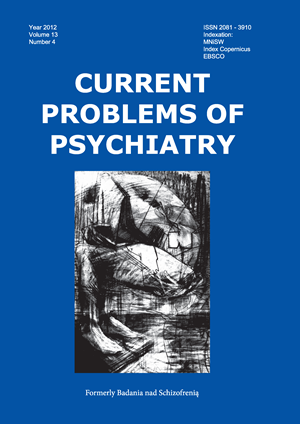Psychological therapy in prosthetic treatment
DOI:
https://doi.org/10.12923/j.2081-3910/13.4/a.09Keywords:
prosthetic rehabilitation, edentulism, prosthetic adaptationAbstract
Prosthetic treatment aims at the restoration of the stomatognathic system normal function. An extremely important element of prosthetic rehabilitation is an appropriate psychological-pedagogical conduct of doctors towards patients, which is related to psychological problems on the part of patients. A successful psychological therapy is frequently decisive for a successful prosthetic treatment, especially in completely edentulous patients, a large percentage of whom are elderly people.
References
1. Porębska H., Lella A. „Szczerbaty ekran”. Gazeta Lekarska, 2010; 8-9: 20-21.
2. Spiechowicz E. Protetyka stomatologiczna. PZWL; Warszawa: 2004.
3. Majewski S. Podstawy protetyki w praktyce lekarskiej i technice dentystycznej. Wydawnictwo Stomatologiczne SZS-W; Kraków: 2000.
4. Gamer S., Tuch R., Garcia L. M. M. House mental classification revisited: Intersection of particular patient types and particular dentist’s needs” J. Prosthet. Dent., 2003; 89: 297-302. https://doi.org/10.1067/mpr.2003.49
5. Friedman N., Landesman H., Wexler M. The influences of fear, anxiety and depression on the patient’s adaptive responses to complete dentures. Part II. J. Prosthet. Dent., 1988; 59: 45-48. https://doi.org/10.1016/0022-3913(88)90106-0
6. Friedman N., Landesman H., Wexler M. The influences of fear, anxiety and depression on the patient’s adaptive responses to complete dentures. Part III. J. Prosthet. Dent., 1988; 59: 169-173. https://doi.org/10.1016/0022-3913(88)90010-8
7. Hupfauf L. Protetyka Stomatologiczna. Protezy całkowite. Urban&Partner; Wrocław: 1994.
8. Bukowska-Piestrzyńska A. Pojawienie się pacjenta w gabinecie. Mag. Stomatol.,, 2012; 2: 102-104.
9. Bukowska-Piestrzyńska A. Obsługa klienta gabinetu stomatologicznego. Wydawnictwo Czelej; Lublin: 2011.
10. Oboda M., Pająk J. Rola i znaczenie pierwszego wrażenia w budowaniu profesjonalnego wizerunku. e-Dentico, 2011; 5(33): 110-113.
11. Szumska M. Trudny pacjent w gabinecie stomatologicznym. e-Dentico, 2010; 2(26): 172-178.
12. Bukowska-Piestrzyńska A. Proszę, przepraszam, dziękuję – narzędzia pracy lekarza dentysty. Mag. Stomatol., 2012; 6: 110-112.
13. Argyle M. Psychologia stosunków międzyludzkich. PWN; Warszawa: 2002.
14. Smółka P. Kompetencje społeczne. Metody pomiaru i doskonalenia umiejętności interpersonalnych. Wolters Kluwer; Kraków: 2008.
15. Romanowicz M., Drobnik K. Depresja - czynnik wpływający na brak efektywności leczenia protetycznego (wyniki badań) – część II. Protet. Stomatol., 2006; 56(50): 346-351.
16. Lucas V. S. Associacion of psychotropic drugs, prevalence of denture-related stomatitis and oral candidosis. Community Dent. Oral Epidemiol., 1993; 21: 313-316. https://doi.org/10.1111/j.1600-0528.1993.tb00782.x


